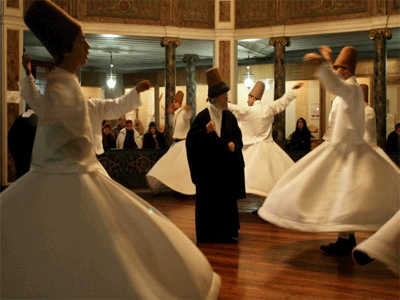- News
- lifestyle
- health-fitness
- de-stress
- Love thyself to love life!
Trending
This story is from February 29, 2016
Love thyself to love life!
Do not take a step on the path of love without a guide. I have tried it one hundred times and failed: Poet Hafiz

Key Highlights
• Sufism is a fragrance of mysticism, which every culture is placed in.
• Sufism has its own DNA and it has flourished in different ways in different environment, and yet there is coherence from Sufis from West Africa, SA, Indonesia, Central Asia, when they meet they are quickly on the same page.
• Sufism has its own DNA and it has flourished in different ways in different environment, and yet there is coherence from Sufis from West Africa, SA, Indonesia, Central Asia, when they meet they are quickly on the same page.
I walked into the Sufi festival at Zorba The Buddha with limited knowledge of Sufism, one that of whirling to Sufi music popularized by our Bollywood flicks. But what followed opened a whole new gamut of thoughts inside my ‘busy’ mind. I realized Sufism is more like a meditative form, like a beautiful fruit of love and longing that teaches self love above all.The state where you no more fret about day to day challenges but accept the goodness of what you have in cognizance of the divine power.
In an exclusive interview with the Pir of Sufi Ruhaniyat International, Shabd Kahn and Shaikh Kabir Helminski, representing the Mevlevi tradition of Jalaluddin Rumi rooted in Turkey, I learnt about the essence of Sufism and the search for true source of happiness. Here is an account of the exclusive chat with the Sufi teachers.
What does Sufism means?
Shabd Kahn: Sufism is a fragrance of mysticism, which every culture is placed in. I live in California and my teacher learnt from an Indian master and was Californian. Having traveled the world, I know the needs of the people living in California are different from those living in Europe or Afghanistan. That way Sufism is a meaningful tool, which speaks to the needs of the people. It is a meaningful tool for people to speak to the people. It is used to awaken and it is aimed at directing spirits.
Also it is important to say that Sufism is a living tradition and has an unbroken continuity. It goes back at least 14 centuries. There were mystics before that but this lineage goes back 14 centuries. It is a tradition of self transcendence and creativity. It is not a tradition that is always fixed or is trying to stay unchanged. The essence of it is so powerful that the cultural expression can change and still be effective. Humans are created to know the true dimension of the divine generosity.
How do we define a Sufi? Who is a Sufi?
Shabd Kahn: The simplest definition would be of someone who breathes well. An experience that lifts you into deep reality and then you come back down to the earth stationed. When you see a person who has courage, manifests kindness and compassion, tolerance, forgiveness, gratitude, patience, you can call them Sufi or mystic.
Shaikh Kabir Helminski: There are so many things one can say but to keep it simple and direct, Sufi is a lover, an archetype of the lover and you know the lover is somebody who is in love with love itself. Our lineage traces back to Jallaludin Rumi and he said the greatest love is love with no object. We learn to love by loving people, nature, art and many things. But there is a progression. Eventually we realize that all the things we love have been brought into existence by this source and the source is love.
We realize there are gifts of love and then there is the giver of those gifts. So when you mature and move to another level, you are thankful to see that the gifts keep coming. You learn about the mysterious relationship that is planned. You become more thankful to the source who is giving you this life. In the end, you become thankful to the capacity of being thankful. Suffering is also a part of that gratefulness. You become so thankful to the source. Being spiritual is one of the greatest gifts and out of that love comes love for humanity and service to humanity.
You said we should be thankful to our suffering. How?
Shaikh Kabir Helminski: When suffering is experienced in the greater context, where we have a sense of meaning, our suffering brings us meaning and then our suffering is bearable. We benefit from the pain and grief. Here I am talking about the pain that is inevitable in life and not the self pitying pain that we get into. That’s a waste. It’s a feedback mechanism. If you wallow in self pity, you will be miserable. One day you will get exhausted with your misery and get over with it and face the real suffering of life.
Is separation with the beloved necessary? Is the longing of love sweeter than the love itself?
Shabd Kahn: One day we were in a Sufi class. One of my students brought a box of chocolates. We tried an experiment. I told them to connect with the longing. We waited the whole day and then I passed it out. I asked them to compare the longing to the joy of eating it. In some way, the longing was sweetest.
Shaikh Kabir Helminski: It is such a subtle question to which Rumi has a subtle answer to. Longing is the love. Sufi has the interest without the capital. We don’t need to possess the object of love because we are in love with love and individual objects are not the points to get immersed in love. He says lovers place their tent in non-existence. It has nothing to do with existence. When you taste that love, longing is the present experience of love. Love is beautiful just like what Majnu had for Laila. It was not a longing of desperation or abandonment. And to live in that love where love is present all the time is in some ways possible.
Shabd Kahn: There is a beautiful peom from Rumi- One night a man was crying, Allah! Allah! His lips grew sweet with the praising, until a cynic said, "So! I have heard you calling out, but have you ever gotten any response?" The man had no answer to that. He quit praying and fell into a confused sleep. He dreamed he saw Khidr, the guide of souls, in a thick, green foliage. “Why did you stop praising?” “Because I've never heard anything back.” “This longing you express is the return message. The grief you cry out from draws you toward union. Your pure sadness that wants help is the secret cup. Listen to the moan of a dog for its master. That whining is the connection. There are love dogs no one knows the names of. Give your life to be one of them.”
Are there any rules for happiness? How can we stay happy?
Shabd Kahn: Our central nature is happiness and freedom. And we constantly think what will make us happy is outside of us, and that if the world would just now change to what we want, we would be happy. But gradually you find this is an inexperienced expectation. It doesn’t fulfill what you want. Gradually we come to a conclusion that what we are looking for is our own self. On the one hand, we have to learn to be extremely at ease with what we have. Because if we create disturbing emotions which doesn’t suit us, we lose our strength and power. We have to learn the mantra that this is how it is right now and make friends with it and do your best to be at ease with whatever comes your way.
Another sweet saying is ‘forgiveness is giving up the hope for a better past’. It should be noted that in order to learn to be at ease, to be tolerant and patient, you need great strength. Just like an athlete would go to the gym to build strength, for us, we need a spiritual gym for mind -recitation, meditation, contemplation, whichever way you build your strength. So when the blow of life comes, you know this is how it is right now. At the same time because of your practice being in tune with the infinite, that sense of infinite is always present.
If you can think of the path having two sides of one coin – one is to have tremendous passion for the goal and the other is to be at ease with whatever comes. You need vairagya, which means letting go. It means letting go of our attachment for the outcome of our wishes. We make an appointment for happiness and we fail. At the same time if we don’t have any wish, life is over. Alchemy is to find the balance.
In an exclusive interview with the Pir of Sufi Ruhaniyat International, Shabd Kahn and Shaikh Kabir Helminski, representing the Mevlevi tradition of Jalaluddin Rumi rooted in Turkey, I learnt about the essence of Sufism and the search for true source of happiness. Here is an account of the exclusive chat with the Sufi teachers.
What does Sufism means?
Shabd Kahn: Sufism is a fragrance of mysticism, which every culture is placed in. I live in California and my teacher learnt from an Indian master and was Californian. Having traveled the world, I know the needs of the people living in California are different from those living in Europe or Afghanistan. That way Sufism is a meaningful tool, which speaks to the needs of the people. It is a meaningful tool for people to speak to the people. It is used to awaken and it is aimed at directing spirits.
Shaikh Kabir Helminski: Sufism has its own DNA and it has flourished in different ways in different environment, and yet there is coherence from Sufis from West Africa, SA, Indonesia, Central Asia, when they meet they are quickly on the same page. There is a deep coherence in the teaching. Law is at the center of it. Everything takes shape by the divine reality and not by the God of one religion.
Also it is important to say that Sufism is a living tradition and has an unbroken continuity. It goes back at least 14 centuries. There were mystics before that but this lineage goes back 14 centuries. It is a tradition of self transcendence and creativity. It is not a tradition that is always fixed or is trying to stay unchanged. The essence of it is so powerful that the cultural expression can change and still be effective. Humans are created to know the true dimension of the divine generosity.
How do we define a Sufi? Who is a Sufi?
Shabd Kahn: The simplest definition would be of someone who breathes well. An experience that lifts you into deep reality and then you come back down to the earth stationed. When you see a person who has courage, manifests kindness and compassion, tolerance, forgiveness, gratitude, patience, you can call them Sufi or mystic.
Shaikh Kabir Helminski: There are so many things one can say but to keep it simple and direct, Sufi is a lover, an archetype of the lover and you know the lover is somebody who is in love with love itself. Our lineage traces back to Jallaludin Rumi and he said the greatest love is love with no object. We learn to love by loving people, nature, art and many things. But there is a progression. Eventually we realize that all the things we love have been brought into existence by this source and the source is love.
We realize there are gifts of love and then there is the giver of those gifts. So when you mature and move to another level, you are thankful to see that the gifts keep coming. You learn about the mysterious relationship that is planned. You become more thankful to the source who is giving you this life. In the end, you become thankful to the capacity of being thankful. Suffering is also a part of that gratefulness. You become so thankful to the source. Being spiritual is one of the greatest gifts and out of that love comes love for humanity and service to humanity.
You said we should be thankful to our suffering. How?
Shaikh Kabir Helminski: When suffering is experienced in the greater context, where we have a sense of meaning, our suffering brings us meaning and then our suffering is bearable. We benefit from the pain and grief. Here I am talking about the pain that is inevitable in life and not the self pitying pain that we get into. That’s a waste. It’s a feedback mechanism. If you wallow in self pity, you will be miserable. One day you will get exhausted with your misery and get over with it and face the real suffering of life.
Is separation with the beloved necessary? Is the longing of love sweeter than the love itself?
Shabd Kahn: One day we were in a Sufi class. One of my students brought a box of chocolates. We tried an experiment. I told them to connect with the longing. We waited the whole day and then I passed it out. I asked them to compare the longing to the joy of eating it. In some way, the longing was sweetest.
Shaikh Kabir Helminski: It is such a subtle question to which Rumi has a subtle answer to. Longing is the love. Sufi has the interest without the capital. We don’t need to possess the object of love because we are in love with love and individual objects are not the points to get immersed in love. He says lovers place their tent in non-existence. It has nothing to do with existence. When you taste that love, longing is the present experience of love. Love is beautiful just like what Majnu had for Laila. It was not a longing of desperation or abandonment. And to live in that love where love is present all the time is in some ways possible.
Shabd Kahn: There is a beautiful peom from Rumi- One night a man was crying, Allah! Allah! His lips grew sweet with the praising, until a cynic said, "So! I have heard you calling out, but have you ever gotten any response?" The man had no answer to that. He quit praying and fell into a confused sleep. He dreamed he saw Khidr, the guide of souls, in a thick, green foliage. “Why did you stop praising?” “Because I've never heard anything back.” “This longing you express is the return message. The grief you cry out from draws you toward union. Your pure sadness that wants help is the secret cup. Listen to the moan of a dog for its master. That whining is the connection. There are love dogs no one knows the names of. Give your life to be one of them.”
Are there any rules for happiness? How can we stay happy?
Shabd Kahn: Our central nature is happiness and freedom. And we constantly think what will make us happy is outside of us, and that if the world would just now change to what we want, we would be happy. But gradually you find this is an inexperienced expectation. It doesn’t fulfill what you want. Gradually we come to a conclusion that what we are looking for is our own self. On the one hand, we have to learn to be extremely at ease with what we have. Because if we create disturbing emotions which doesn’t suit us, we lose our strength and power. We have to learn the mantra that this is how it is right now and make friends with it and do your best to be at ease with whatever comes your way.
Another sweet saying is ‘forgiveness is giving up the hope for a better past’. It should be noted that in order to learn to be at ease, to be tolerant and patient, you need great strength. Just like an athlete would go to the gym to build strength, for us, we need a spiritual gym for mind -recitation, meditation, contemplation, whichever way you build your strength. So when the blow of life comes, you know this is how it is right now. At the same time because of your practice being in tune with the infinite, that sense of infinite is always present.
If you can think of the path having two sides of one coin – one is to have tremendous passion for the goal and the other is to be at ease with whatever comes. You need vairagya, which means letting go. It means letting go of our attachment for the outcome of our wishes. We make an appointment for happiness and we fail. At the same time if we don’t have any wish, life is over. Alchemy is to find the balance.
End of Article
FOLLOW US ON SOCIAL MEDIA









